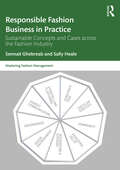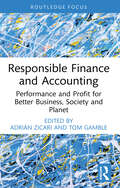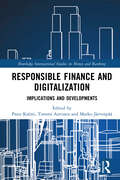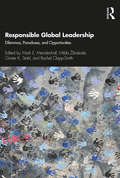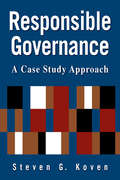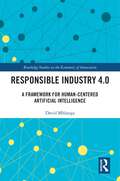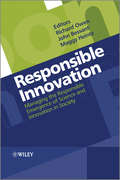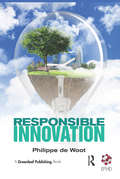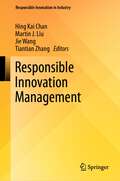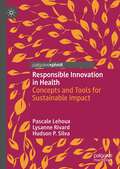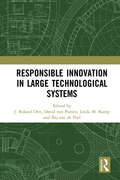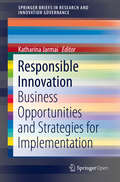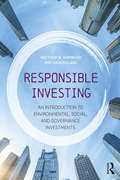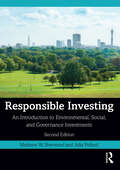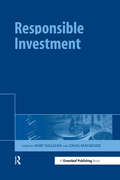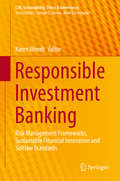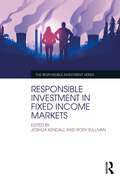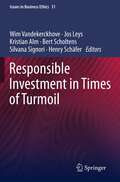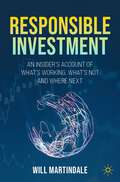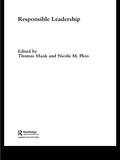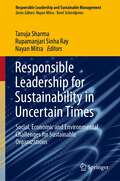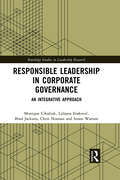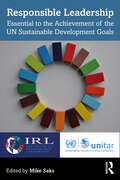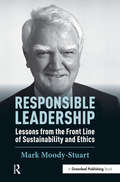- Table View
- List View
Responsible Fashion Business in Practice: Sustainable Concepts and Cases across the Fashion Industry (Mastering Fashion Management)
by Sennait Ghebreab Sally HealeThis unique text offers a holistic, insightful and timely exploration of sustainable practices across the fashion industry. The book takes the reader logically through each part of the authors’ new Responsible 9 Framework™, providing a clear perspective and examples for each component. The framework thoroughly explains the move away from a singular product commercial focus to a Conscious Item approach and Circular Services business mindset. An organisation’s people are at the heart of the new framework and have therefore been rebranded as Community. Next addressed is the Perceived Value of an item or brand, and how sustainable pricing initiatives actively influence consumer purchase. Insights into Accountable Systems are reviewed to examine the importance of responsible processes when considering and integrating a successful, sustainable supply chain into a fashion business. The section on Governance looks at the different global organisations available to fashion brands and customers alike, which support their transition into a responsible and sustainable future existence. The last two sections of the framework are labelled Storytelling Platforms and Honest Communication, where transparent and honest strategies are highlighted and discussed from a viewpoint of how modern brands are engaging and connecting to the new conscious consumer. For each of the nine aspects, contemporary case studies from global brands such as Stella McCartney, Zalando and Arc'teryx, alongside insights from current, leading experts within the fashion world, bring the theory to life. Showing how sustainability has been integrated throughout the entirety of the fashion business, this textbook is perfect for advanced undergraduate and postgraduate students Fashion Management, Fashion Brand Management and Fashion Marketing, as well as reflective leaders and practitioners within the industry.
Responsible Finance and Accounting: Performance and Profit for Better Business, Society and Planet (Routledge COBS Focus on Responsible Business)
by Adrián Zicari Tom GambleThe UN Sustainable Development Goals, an increasing interest in Environmental, Social, and Governance factors, the climate crisis, stakeholder pressure, the lessons of corporate scandals, and the COVID-19 pandemic have triggered a massive change in how companies approach finance and accounting practices. From being a ‘nice-to-have’ to becoming a ‘must-have’, Responsible Finance and Accounting positions itself as a key pillar in tomorrow’s better world for business, society, and planet. In this book, leading researchers and practitioners in the field of corporate social responsibility, from the schools and corporate partners of the Council on Business & Society, give you key insights into green finance and social and environmental reporting, national, international and corporate stakes in green taxonomy and carbon tax, and triple capital accounting. It also details how to model effective and low-cost social impact reporting, ethics in finance and accounting, and strategies for microfinance and finance-related social innovation. Each insight is accompanied by key takeaways, food for thought, and micro-case study sections. This accessible book will be a valuable resource for scholars, instructors, and upper-level students across finance and accounting as well as corporate social responsibility and business ethics. It will also serve as a guide for professionals aiming to deepen their understanding of new finance and accounting practice.
Responsible Finance and Digitalization: Implications and Developments (Routledge International Studies in Money and Banking)
by Panu Kalmi Tommi Auvinen Marko JärvenpääThe aftermath of the 2008 crisis has substantially increased the regulation of banks and insurance companies and curtailed their risk taking, which has shifted much of the risk to their clients: firms and consumers. At the same time, digitalization has encouraged the entry of new firms combining finance and technological innovation, a phenomenon known as FinTech. The emergence of non-bank financial entities has contributed to the fragmentation of financial services, and also opened up new markets. Furthermore, the growing emphasis on corporate social responsibility has made it increasingly important for financial organizations to care about their public image. Drawing together these diverse strands, this book examines how the financial sector is evolving and how the existing actors are adapting to the institutional change and to the challenges from new actors and competitors. It also addresses the issue of how financial organizations are providing fixes to the challenges at the systemic level and how a healthier, more diverse and socially responsible financial sector is beneficial to the operations of the market economy as a whole. While there are books that address each of these issues, and also books that look at organizational diversity, there are few that investigate their interconnectedness. Responsible Finance and Digitalization offers a topical overview of the changes that are taking place in the financial sector and how the financial sector itself can contribute to solving global challenges. It equips both students (at MBA and other levels) and practitioners with analytical tools to reflect on this change and to take appropriate action to ensure that their organization can successfully navigate it and create value.
Responsible Global Leadership: Dilemmas, Paradoxes, and Opportunities
by Günter K. Stahl Mark E. Mendenhall Milda Zilinskait 279 Rachel Clapp-SmithThe need to ensure principle-driven, legally sound, and ethically acceptable behavior in the global context is not an easy task for leaders. They face the requirement of meeting the needs and expectations of a diverse set of stakeholders. They are increasingly called upon to protect, preserve, and restore the resources of the environment. They are expected to improve human well-being and social equity and recognize and effectively address economic and social issues concerning equality, social justice, and human rights protection. How should leaders in global organizations go about meeting the multiple demands of a complex global stakeholder environment? This book explores the dilemmas, paradoxes, and opportunities that leaders in global organizations of all types confront daily and addresses how managers can and should think about and approach these complex issues in responsible and productive ways. This book will be of interest to students and scholars across business, management and the social sciences more broadly.
Responsible Governance: A Case Study Approach
by Steven G. KovenThis book is designed to show readers how ethics can constrain improper behavior. To demonstrate the relationship of ethics to good government, the author presents high profile case studies that were selected for their notoriety and their ability to connect the reader to fundamental ethical questions. Themes of public interest, natural law, and rule of law provide a framework for the case studies, which include torture (Abu Ghraib), impeachment (Clinton), competence (FEMA), electoral violation (DeLay), and historical corruption (machine politics). The chapters discuss concepts that help to define responsible behavior in terms of behavior in elections, honesty and competence, and international law.
Responsible Industry 4.0: A Framework for Human-Centered Artificial Intelligence (Routledge Studies in the Economics of Innovation)
by David MhlangaThe growth of digital technologies and Artificial Intelligence (AI) has the potential to increase global wealth and tackle some of the world's most serious problems, including economic marginalization. In contrast, these innovations may contribute to widening economic gaps and potentially threaten the stability of democratic governments. Changes in economic growth and distribution are occurring in both developed and developing countries due to the impact that new technologies are having on businesses and the workplace. This book provides answers to the question of whether the technologies of the Fourth Industrial Revolution, such as Artificial Intelligence, will lead to greater economic uncertainty, environmental collapse, and social unrest or whether they will help achieve shared prosperity and sustainable development, and successively the Sustainable Development Goals (SDGs). The book focuses on Human-centered Artificial Intelligence (AI) and the responsible deployment of diverse technologies for achieving sustainable development. It examines why the human-centred approach is so crucial to long-term success. It underlines the definition of human-centred AI and its importance in creating sustainability and resilience. It starts with a comprehensive history of the Fourth Industrial Revolution, details how to produce artificial intelligence that is centred on humans in order to accomplish sustainable development in the era of the Fourth Industrial Revolution, and then goes on to discuss the need for proper management and governance of emerging technologies. The book ends by presenting a framework that will assist stakeholders in employing AI in a human-centred manner to achieve the sustainable development goals set for 2030. The book will appeal to scholars, academics and researchers interested in information linked to the SDGs, AI and industry 4.0.
Responsible Innovation
by John Bessant Maggy Heintz Richard OwenScience and innovation have the power to transform our lives and the world we live in - for better or worse - in ways that often transcend borders and generations: from the innovation of complex financial products that played such an important role in the recent financial crisis to current proposals to intentionally engineer our Earth's climate. The promise of science and innovation brings with it ethical dilemmas and impacts which are often uncertain and unpredictable: it is often only once these have emerged that we feel able to control them. How do we undertake science and innovation responsibly under such conditions, towards not only socially acceptable, but socially desirable goals and in a way that is democratic, equitable and sustainable? Responsible innovation challenges us all to think about our responsibilities for the future, as scientists, innovators and citizens, and to act upon these.This book begins with a description of the current landscape of innovation and in subsequent chapters offers perspectives on the emerging concept of responsible innovation and its historical foundations, including key elements of a responsible innovation approach and examples of practical implementation. Written in a constructive and accessible way, Responsible Innovation includes chapters on:Innovation and its management in the 21st centuryA vision and framework for responsible innovationConcepts of future-oriented responsibility as an underpinning philosophyValues - sensitive designKey themes of anticipation, reflection, deliberation and responsivenessMulti - level governance and regulationPerspectives on responsible innovation in finance, ICT, geoengineering and nanotechnologyEssentially multidisciplinary in nature, this landmark text combines research from the fields of science and technology studies, philosophy, innovation governance, business studies and beyond to address the question, "How do we ensure the responsible emergence of science and innovation in society?"
Responsible Innovation
by Philippe de WootEconomic development is rooted in disruption, not in equilibrium. And a powerful engine of economic development is innovation; but is this innovation always for the common good? The dark side of the extraordinary dynamism of innovation lies precisely in its destructive power. If simply left to market forces, it could lead to social chaos and great human suffering. To face the challenges of our time, we must create the proper climate and culture to develop strong entrepreneurial drive. But, more than ever, we must give this entrepreneurial drive its ethical and societal dimensions. Responsible innovation means a more voluntary orientation towards the great problems of the 21st century, e.g. depletion of the planet’s resources, rising inequality, and new scientific developments potentially threatening freedom, democracy and human integrity. We need to transform our ceaseless creativity into real progress for humankind. In this respect, the rapid development of social innovation opens the door for new methods and practices. In Responsible Innovation, Philippe de Woot challenges conventional ways of thinking. This book has the power to shift accepted norms in our ways of doing business.
Responsible Innovation Management (Responsible Innovation in Industry)
by Hing Kai Chan Tiantian Zhang Jie Wang Martin J. LiuThis book features state-of-the-art studies on the responsible innovation management. It illustrates the innovative methods from socio-economic and sustainable development dimensions and specifically mentions digitalisation’s dark side, technology application challenges and enterprises management issues. The selected works contain enormous new case studies exploring ways to improve the development of related industries from responsible innovation perspectives. It covers about the multidisciplinary areas, and hence, it fosters close collaboration between researchers in diverse fields such as social science, economics and engineering. Researchers, corporate executives and engineers in these areas can benefit from the book.
Responsible Innovation in Health: Concepts and Tools for Sustainable Impact
by Pascale Lehoux Lysanne Rivard Hudson P. SilvaThis book introduces the field of Responsible Innovation in Health (RIH) by clarifying its theoretical foundations and the practical approaches that enable the design and production of responsible medical devices, health and social care interventions, digital tools and solutions based on artificial intelligence. It brings a lasting impact on the ways innovation stakeholders think about and develop solutions to twenty-first century challenges, including the Sustainable Development Goals (SDGs).
Responsible Innovation in Large Technological Systems
by J. Roland Ortt Ibo Van De Poel David Van Putten Linda M. KampLarge technological systems, such as seaports, nuclear power stations, wind farms and natural gas extraction, provide vital functions for society. And yet these large technological systems have an impact on different stakeholder groups in both positive and negative ways. This book defines responsible innovation and describes how both the innovation process and the resulting innovation outcome can be designed, created and implemented in a way that respects the various stakeholder groups involved and affected by the system. Taking a case-based approach, a number of large technological systems are profiled, including hydraulic engineering, nuclear energy, smart metering, and wind power. The values of each of the stakeholder groups, and the costs and benefits of the systems presented, are analysed. The book concludes by combining these insights to provide a framework for how responsible innovation of large technological systems can be implemented in practice. The book will be of particular interest to undergraduate and postgraduate students and researchers in technology and innovation management, and corporate governance, CSR and business ethics.
Responsible Innovation: Business Opportunities and Strategies for Implementation (SpringerBriefs in Research and Innovation Governance)
by Katharina JarmaiThis Open Access book, Responsible innovation provides benefits for society, for instance more sustainable products, more engagement with consumers and less anxiety about emerging technologies. As a governance tool it is mostly driven by research funders, including the European Commission, under the term “responsible research and innovation” (RRI). To achieve uptake in private industry is a challenge. This book provides successful case studies for the implementation of responsible innovation in businesses. The importance of social innovations is emphasized as a link between benefits for society and profits for businesses, especially SMEs. For corporate industry it is shown how responsible innovation can offer a competitive advantage to adopters. The book is based on the latest insights from theory and practice and combines conceptual work with first-hand experience. It is of interest to innovation managers, entrepreneurs and academics. For academics, the book will provide a combination of analysis and discussion, and present recent learnings from first-hand interaction with entrepreneurs. For innovation managers and entrepreneurs, it will provide inspiration and better ideas about what responsible innovation can look like in practice, why others have “done it” and what the potential benefits might be. The book will thus serve the purposes of spreading the word about the responsible innovation concept among different audiences whilst making it more accessible to innovation managers and entrepreneurs.
Responsible Investing: An Introduction to Environmental, Social, and Governance Investments
by Matthew W. Sherwood Julia PollardThis textbook provides the first holistic resource on Environmental, Social, and Governance (ESG) investing for undergraduate and graduate programs. It provides a thorough background and history of ESG investing, as well as cutting-edge industry developments, in a way that introduces the reader to the rapidly developing field of responsible investing. Beginning with a comprehensive background of ESG investing and the development of models measuring risk and return, the book then discusses the development of ESG risks, and provides an overview of ESG rating systems. The textbook also outlines the current position of ESG investing in portfolio management through granular analysis, provides insight into common investor concerns about ESG investments, discloses qualitative theories relevant to ESG investing, and reviews literature attempting to model ESG investment performance. Finally, the authors provide readers with a foundation on the development of financial models measuring risk and return, which will be useful for measuring the performance of ESG investments. With case studies from contributors around the world, this textbook is the first of its kind to truly provide a compelling blend of quantitative and qualitative analysis supporting the incorporation of ESG investment strategies into investment portfolios. Offering an excellent overview of the growing trends in ESG investing, as well as a close analysis of ESG theories and their practical application both today and in the future, this book will be a great resource for both undergraduates and graduate students.
Responsible Investing: An Introduction to Environmental, Social, and Governance Investments
by Matthew W. Sherwood Julia PollardResponsible Investing serves as a holistic resource on Environmental, Social, and Governance (ESG) investing for undergraduate and graduate programs. It provides a thorough background and history of ESG investing, as well as cutting-edge industry developments, introducing the reader to the rapidly evolving field of responsible investing. Building on the first edition, this second edition provides updates where appropriate, as well as new emphasis on the development of standards in terminology and metrics. Opening with the background of ESG investing, the book discusses the development of ESG risks and provides an overview of ESG rating systems. It outlines the current position of ESG investing in portfolio management through granular analysis, offers insight into common investor concerns about ESG investments, presents qualitative theories, and reviews literature modeling ESG investment performance. Finally, the authors provide readers with a foundation on the development of financial models measuring risk and return, which can be used to evaluate the performance of ESG investments. This edition features updated statistics and a new chapter on regulation, reporting, and taxonomy in ESG investing, as well as new international case studies. Following a summary approach, Responsible Investing is a valuable textbook, providing a context in which upper-level students of ESG investment and sustainable finance can specialize.
Responsible Investment (The Responsible Investment Series)
by Craig Mackenzie Rory SullivanMost investment today is conducted by a relatively small number of institutional investors – pension funds and investment managers – who manage the pensions and saving funds of millions of ordinary people. The manner in which these institutional investors invest and discharge their responsibilities as the owners of companies is, therefore, of critical importance to society as a whole. In recent years, some of the biggest institutional investors have actively encouraged companies to improve their management of social, ethical and environmental issues. A number have also sought to explicitly analyse companies' performance on these issues and to incorporate this analysis into investment decision-making. These activities have contributed to important changes: a number of companies have committed to stabilising or reducing greenhouse gas emissions from their activities and operations, labour conditions in many retail supply chains have improved significantly, and many companies have significantly improved their governance of corporate responsibility issues. However, to date, there has been little systematic analysis of fundamental questions such as: Do responsible investment strategies systematically result in improvements in the social, ethical and environmental performance of companies? To what extent is it in investors' interest to encourage higher standards of corporate responsibility? Do responsible investment strategies enhance financial performance for investors? In this ground-breaking collection, Rory Sullivan and Craig Mackenzie have brought together some of the leading practitioners and commentators in the field of responsible investment to explore these questions. The contributors to this book present their views on the practicalities of implementing responsible investment strategies, the outcomes that have been achieved, the practical issues and barriers faced in implementing such strategies, and the challenges to be faced if responsible investment is to become a mainstream investment approach. The results are both unique and surprising. This book will be mandatory reading for all those involved in the field of social and environmentally responsible investment, corporate governance and corporate social responsibility whether they be academics, researchers or practitioners.
Responsible Investment Banking
by Karen WendtThis book provides evidence on the relevance of environmental and social factors in decision making. It discusses the Gold Standard Frameworks for integrating extra-financial risks into the philosophy, culture, strategies, products and value chain management procedures of investment and banking and highlights the current emergence of global administrative law. New emerging topics like positive impact investing and finance, climate friendly markets, human rights, the enhanced role of fiduciary duties and shared values are approached with a lot of examples for practical application. Steps towards a new banking culture, a new climate for double loop learning and sustainable financial innovation are outlined and the additional benefits of robust stakeholder engagement explained. The anthology paves the way from robust impact and risk management to positive impact creation and a new investment culture. As well, challenges for the implementation and ways to overcome them are broadly discussed. The book is rooted in the fact that institutions and investors which fail to professionally integrate the management of extra-financial risk into their whole lending and investment chain and fail to move to positive impact creation may well loose positions and mandates and finally the trust of their clients, partners and stakeholders. The contributing authors of this anthology are internationally renowned experts in the field of ESG and impact investing. The compendium brings together practitioners and academics to allow a confluence of thoughts, concepts and viewpoints. This huge variety of perspectives and approaches makes this volume a comprehensive compendium on responsible investment and banking.
Responsible Investment in Fixed Income Markets (The Responsible Investment Series)
by Joshua Kendall Rory SullivanThis book provides the world’s first comprehensive account of responsible investment for fixed income investors. It enables readers to understand the key characteristics of fixed income investments and the relevance of sustainability-related issues to fixed income markets. The expert contributors to this volume explain how sustainability-related issues can be taken into account in fixed income research and decision-making, in portfolio construction, and in active ownership (engagement). They provide a series of detailed case-studies from different parts of the fixed income market (corporate investment grade and high yield, emerging markets, sovereign and municipal debt), from a range of organisations with a variety of investment approaches. The contributors also provide in-depth critical analysis of key issues such as the role and influence of credit rating agencies, green bonds, data and public policy in shaping investment practice. For investors, this book provides practical guidance on how to improve the financial and the sustainability performance of their fixed income investments. For stakeholders such as companies, civil society organisations, and governments it allows them to understand the role that fixed income might play in delivering the Sustainable Development Goals (SDGs), and to understand how they might encourage fixed income investors to pay greater attention to sustainability-related issues in their investment practices and processes.
Responsible Investment in Times of Turmoil
by Wim Vandekerckhove Henry Schäfer Silvana Signori Bert Scholtens Jos Leys Kristian AlmThe SRI phenomenon is said to be entering the mainstream of financial intermediation. From a fairly marginal practice promoted or campaigned for by NGO's and at odds with financial practice and orthodoxy it grew into well formulated policy adopted by a wide range of investors. Academic literature on SRI has also boomed on the assumption that mainstreaming is taking place. However, little thinking has been carried out on questions specifically arising from this alleged 'mainstreaming'. This book, addressed to those with a scholarly or practitioner's interest in SRI, starts filling this neglected dimension. Today, one cannot ignore the difficulties of main stream financing. The financial spheres are trembling globally in one of the worst crises since the 1930's. As a response to the crisis, the intermediation of 'financial responsibility' will undoubtedly be the subject of new regulation and scrutinizing. This book looks into what these turbulences will imply for SRI. In view of these circumstances, one might or even should, ask oneself whether the phenomenon was not an empty fad during the exuberant high of financial euphoria that came abruptly to an end with current financial crises. To put it rather sec: are financial intermediaries that promote 'sustainability' credible, while it is obvious that some developments in financial intermediation -predictably, as some say- were unsustainable? Is this an opportunity for enhancing SRI because of the strength and superiority it has developed or will it disappear due to a return to financial myopia? This book is the first to question the future of SRI in such a radical way.
Responsible Investment: An Insider's Account of What's Working, What's Not and Where Next
by Will MartindaleResponsible investment is going through a period of rapid change, from voluntary to mandatory, with regulators working to tackle greenwashing, investors responding to client and savers' demands, a proliferation of new sustainability themes and increased focus on real-world impact. Responsible investment is also ‘growing up’. And part of growing up is acknowledging limits and complexities, and making difficult decisions. Responsible investment has got this far by sticking to the script and not talking about the awkward bits in public. But this is no longer an option, and so it’s not surprising that it draws its critics. Part textbook, part briefing, part storytelling, this book is a personal and accessible account about the growth of an industry, what it’s got right, what it’s got wrong and if responsible investment is to matter, where we go next.
Responsible Leadership
by Nicola M. PlessThe second edition of Responsible Leadership offers orienting knowledge on how to lead in a world of contested values—a world where leadership work extends beyond leaders and direct reports to a whole range of stakeholders inside and outside an organization. The new edition comes at a time where leaders face growing expectations to do better, and more, and where leadership challenges such as the ethical tragedy of climate change and global pandemics highlight the urgency of collective action. Updated and significantly extended, the second edition of this much acclaimed volume assembles leading scholars and practitioners in the field. It includes new chapters on inclusive leadership, the study of responsible leadership, the purpose of organizations, authenticity and values, virtuous leadership, irresponsible leadership, the paradoxical nature of responsible leadership, responsible leadership in context and in Asia, artistic expression to enable responsible leadership, responsible leadership measurement, and new directions for responsible leadership. This volume offers rich and functional insights into the concept and practice of responsible leadership. It will appeal to academics and practitioners alike with a wide array of perspectives grounded in pioneering scholarship and best practice.
Responsible Leadership
by Thomas Maak Nicola M. PlessWhile there is a high demand for knowledge on responsible leadership, there has been, till now, no source able to meet that demand. Enron, Worldcom and other high-profile cases of management and leadership misconduct have highlighted the need for such a book to provide crucial insights on key issues including responsible leadership, leadership competencies and the development of responsible leaders. Meeting this need, experts in the field of business and leadership ethics have now been brought together to write this vital text - the first of its kind. It answers the challenge of defining responsible leadership in an era of globalization, and as such is highly topical and relevant to all those on the path to becoming responsible leaders. Topical and timely, this first-rate edited collection provides the reader with insights, orienting knowledge and best practice cases in the field and is essential reading for all business students, academics and professionals concerned with leadership in twenty-first century business.
Responsible Leadership for Sustainability in Uncertain Times: Social, Economic and Environmental Challenges for Sustainable Organizations (Responsible Leadership and Sustainable Management)
by Nayan Mitra Tanuja Sharma Rupamanjari Sinha RayThis book contains compilation of emerging discourses on responsible leadership for sustainability in uncertain times. Uncertainty is looming large at global level due to COVID, climatic disruptions and persisting social discriminations, especially since the pandemic, which have disrupted economies at both local and global levels. Technology was a boon to mitigate hardships emerging from such disruptions. The book documents the leadership roles, welfare issues, best practices and innovations that help organizations to sustain in a VUCA world. Economic, social and environmental concerns and their mitigation as documented in this book will be relevant for future planning and execution for sustainable existence. A blend of research by practitioners and academicians, capturing organizational experiences through case studies makes it attractive for a wide range of readership. Business leaders will find this book extremely helpful to understand the nuances and insights for responsible leadership and innovative strategies for stakeholder management and engagement for sustained businesses. Practitioners would get insights into responsible leadership for improving existing sustainable practices and speed up the transition which is necessitated due to disruptions. Prospective entrepreneurs may find that book helpful for creating responsible organizations which are sustainable due to responsible management of resources, employees and environment. Students and researchers can learn from the cases and documentation on responsible leadership, social and environmental concerns and sustainability in this book.
Responsible Leadership in Corporate Governance: An Integrative Approach (Routledge Studies in Leadership Research)
by Brad Jackson Chris Noonan Susan Watson Monique Cikaliuk Ljiljana ErakovicResponsibly led boards of directors make it possible for modern companies to survive and prosper under conditions of change. Despite the importance of boards of directors, their activities are often lionised or vilified by shareholders and stakeholders which obscures how boards enact responsible leadership. Responsible Leadership in Corporate Governance: An Integrative Approach introduces an integrative model of responsible leadership in governance that positions the board as a nexus of all corporate participants. In this model, responsibly led boards seek to make decisions in the best interests of the modern company as an entity that operates in a dynamic business environment. This book provides a timely focus on in-depth cases of board led responsible leadership. Examining boards of directors in listed companies, state-owned enterprises, and private companies, the book connects insights from corporate governance and leadership to behaviours that affect boards’ relationships with shareholders and stakeholders. In addition, these insights underscore key requirements and challenges of responsible leadership in governance: from the importance of purpose and the crucial role of value creation to the difficulties of ownership transition and accountability. Far-sighted and experienced-based, this book will not only help students connect to real world situations but also will benefit those that interact with and support boards of directors.
Responsible Leadership: Essential to the Achievement of the UN Sustainable Development Goals
by Mike SaksWith a range of well-respected voices from across the business, political, third sector and research spectrum, this important book provides an accessible insight into responsible leadership. It represents the most comprehensive and informed work on responsible leadership linked to the United Nations (UN) Sustainable Development Goals (SDGs) produced to date. This carefully edited volume, based on a collaborative partnership between the Institute for Responsible Leadership (IRL) and the United Nations Institute for Training and Research (UNITAR), contains twenty chapters in seven parts which address the relationship between responsible leadership and the UN Sustainable Development Goals. These original and accessible contributions discuss progress in a variety of areas relevant to the goals, including climate change and biodiversity, global health, cybercrime, human trafficking, corporate social responsibility, gender, education and social cohesion. The world-leading expert contributors are drawn from a wide range of societies and continents and cover key aspects of responsible leadership in a lively and impactful fashion. This book is for leaders at every level in the public, private and third sectors, students concerned with responsible leadership, academics and researchers studying leadership in different disciplinary fields, and all those committed to sustainable development and progressing the UN SDGs.
Responsible Leadership: Lessons from the Front Line of Sustainability and Ethics
by Mark Moody-StuartAs Chairman of the Royal Dutch/Shell Group from 1991–2001 and Anglo American plc from 2002–2009, Sir Mark Moody-Stuart is as qualified as anyone on the planet to discuss the realities, dilemmas and lessons to be learnt from the last 20 years of corporate engagement with sustainability, ethics and responsibility. In this unique book – part memoir, part confessional, part manifesto for leadership – we hear a unique voice from the front line of corporate responsibility. Moody-Stuart retraces the steps of a remarkable journey from being a postgraduate geologist to being at the helm of two of the largest corporations in the world.We hear of dealings with dictators and prime ministers, colleagues and NGOs, rivals and friends. We travel from Syria to Nigeria; Iraq to Downing Street; and from the machinations of the United Nations to those inside the boardroom of Shell. We see Shell’s annus horribilis in 1995 unfold through the eyes of an insider, and how Brent Spar and the execution of Ken Saro-Wiwa sent shockwaves through the company, resulting in a complete reappraisal of its mission and principles. We hear about the oil and mining sectors and their complicated development role in areas of conflict and corruption; the way that markets have failed us on climate change and corruption; and how governments need to step up to the global challenges we face. We hear how Deepwater Horizon could have been avoided; what Shell were asked to do by Tony Blair during the UK fuel blockades of 2000 and why they declined; why China is too important to ignore; and why the Global Compact is too important to fail. We hear lessons from a life spent living in 10 different countries and we come to realize that, for corporations, trying to do the right thing can sometimes be almost impossible. We also come to know a deeply ethical and thoughtful leader who has always tried to do exactly that.
